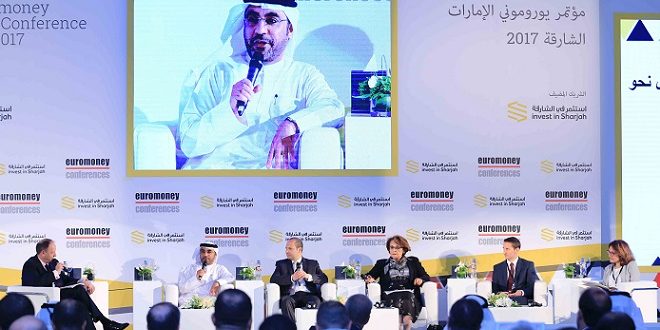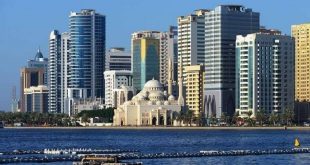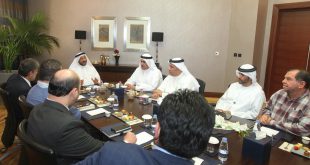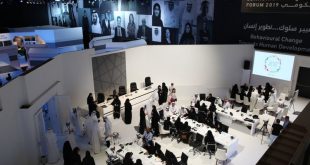The Euromoney Emirates 2017 Conference has told business leaders and financiers from around the region that they need to prepare themselves for a financial revolution as global commerce and consumer spending heads toward cashless societies and the world turns to innovative economies.
In a series of bold predictions and stark warnings, eminent speakers at the two-day conference told delegates that technology, entrepreneurship, diversification and free zone productivity were crucial in driving growth.
Held under the patronage of His Highness Sheikh Sultan bin Mohamad bin Sultan Al Qasimi, Crown Prince and Deputy Ruler of Sharjah, and in the presence of Sheikh Khalid Bin Essam Al Qasimi, Chairman of Department of Civil Aviation, Sharjah, the conference is co-hosted and organised by Sharjah FDI Office ‘Invest in Sharjah’ at the Sheraton Sharjah Beach Resort.
Opening Remarks
In the opening remarks, Richard Banks, Consulting Editor, Euromoney Conferences, said: “Voices against free trade are the loudest they have been for many decades.
“One cannot fail to notice that all our headlines have been dominated by Mr Trump and Brexit. The supporters of both broadly share a nativist, bilateral, conservative and somewhat protectionist worldview – something that is in clear contrast to the multilateral progressiveness of their opposition.”
He observed that while the transformation of the UAE economy has been nothing short of a miracle in the past 30 years, given these radical global changes, what will happen in the next 30 years and if there are still chances for similar or better growth was the question he raised.
Investment locations of the future will need to be ‘innovators’, and innovation will be desired in both public and private sectors as well as the need for finance and in particular equity risk capital.
Keynote address
Highlighting the rapid technological advancement the world has witnessed in the past couple of decades, and the need for developing a ‘soft, technology-based infrastructure’ in the UAE, HE Younis Haji Alkhoori, Undersecretary, Ministry of Finance, UAE, remarked: “It is a fact that the speed at which technology has developed has left many confused including the industry. Numerous companies have disappeared and have been replaced by new business models, which are radically different. Airbnb, Facebook and Uber, for instance, where they have no content, no taxis, and no residential units, and yet are the largest in their field.”
He insisted that while initially the introduction of new technologies may seem disruptive because it comes as a shock, businesses eventually absorb that shock and adapt to these necessary changes becoming better equipped to benefit from an innovative business culture and enjoying the technological competitive advantages that result from it.
Panel I: The Macro-Economic Imperative for Innovative Economies
In the first panel, ‘The Macro-Economic Imperative for Innovative Economies’, the speakers tried to provide an overview of global economic trends, and speculate on a possible way forward for the UAE economy, particularly Sharjah. On the panel were Alia Moubayed, Director of Geo-economics and Strategy, International Institute for Strategic Studies; Tom Koczwara, Director, Debt Management Office, Finance Department, Government of Sharjah; Dr Magda Kandil, Chief Economist, Head of Research, Central Bank of the United Arab Emirates; Tarek Fadlallah, Managing Director & CEO, Nomura Asset Management; and Hussain Mohammed Al Mahmoudi, CEO, American University of Sharjah Enterprises (AUSE).’
The panelists agreed that it had been a politically tumultuous year and despite ‘global synchronised recovery’ there were still some weaknesses and shortfalls.
The panel warned that we are barely seeing signs of recovery and that the negligible and ununiform stimulus, which is being provided to some economies is a reflection of structural weakness in global policymaking. This could pose a risk to all parts of the world, including the UAE.
Panel II: The Lifeblood of the Innovative Economy: SMEs in the Emirates
Moderated by Victoria Behn, the MEA Director of Euromoney Conferences, a discussion on how SME’s can become the engine for sustainable growth in the emirates was taken up by a panel comprising Eman Al Mahmoud, Programs Manager, Sharjah Entrepreneurship Center (Sheraa); Walid Hanna, Founder and Managing Partner, Middle East Venture Partners; and Noor Shawwa, Managing Director, Endeavour, UAE.
The long list of challenges faced by entrepreneurs in the region, and the UAE in particular, was discussed, including access to capital. Risk capital is available but can be difficult for entrepreneurs to find, and venture capital funds are selective.
The panelists highlighted that as the UAE increasingly moves away from an oil-based economy, the role of knowledge based economies driven by startups and SMEs becomes increasingly important. “A collective ecosystem of support needs to be created for entrepreneurs,” said Al Mahmoud.
The question was put up on a poll on the Euromoney app, and 80% of responses were in the positive – pointing to a general consensus in the nation about the UAE having a supportive environment for the growth and development of SMEs.
“Educating the market is of utmost importance, and takes a lot of time. Banks may not lend very easily today just because they are not truly aware of the stakes involved,” Mr Shawwa pointed out.
In a special session involving HE Dr Khalid Omar Al Midfa, Chairman, Sharjah Media City, Krysta Fox, Executive Director, DMCC Freezone and Iain Rawlinson, Group Commercial Director for Gulftainer, the advantages of free zones and the roles they can play in evolving economies was discussed.
Iain Rawlinson believes that with a logistics business such as Gulftainer, the customs incentives and lack of bureaucracy are a great advantage, but there are always options to invest in a virtual economy. “Whether that is through technical innovations or through opportunities such as going further to track deliveries and cargo, we must not rule anything out. Despite economic growth, whatever that rate may be, as an industry, we have seen our role decrease in the overall contribution to GDP and innovation and diversification is something that must be investigated and acted upon where necessary.”
HE Dr Khalid Omar Al Midfa said that for any industry, free zones will play a massive part in the future of enterprise and Sharjah Media City is determined to make the most of their status.
“We have the enormous benefits of a tax free environment, one hundred percent foreign ownership and we have the vision to not just create a place of business and entrepreneurship, we are looking for a full working city where there is schooling, residential, everything you could need without going out of the free zone boundaries. For us this is innovation and enterprise and I believe we will attract many overseas visitors and also global organisations to adopt this business model.”
As for Krysta Fox, she said that the DMCC Free Zone, based in Jumeirah Lakes Towers in Dubai has developed its own ecosystem.
“As the expansion of the commodities sector increased, we saw that the professional services, grew with it. There was an organic growth, not just in the number of businesses – which is now 13,500 – but also the variety of sectors. We are seeing the creative industries play a greater role and take advantage of the solutions we have to offer as a free zone.”
In a separate interview, Adel Ali, Group CEO, Air Arabia, said that an innovative economy should always be adopted in order to progress. “We have always invested in the latest technology, the latest way to serve our customers and most efficient ways to run as a business. We have not been prompted to take these steps it is something that we need to do to stay ahead of what is an enormously competitive market in this region.”
”It was not too long ago that you needed a hundred pieces of paper to travel, now you don’t need to see a piece of paper until you get to the airport. We believe in innovation and we believe we have always been an innovative company.”
In a session on education and research, Björn Kjerfve, Chancellor, American University Sharjah highlighted that there are 117 universities in the UAE, and that 80 percent are for profit. He observed that in the next five years, AUS, under the vision and patronage of its founder HH Dr. Sheikh Sultan Muhammad Al Qasimi, Member of the Supreme Council Ruler of Sharjah, will be transformed into a leading graduate research university with a student to faculty ratio of 11.5:1 – the standard global ratio of an undergraduate institution in the US or the UK.
He spoke about launching at least as many specialised PhD programmes in regionally relevant fields with a global impact, such as, biosciences and bioengineering, earth and environmental science, information technology and material science. The PhD programme degrees that are born out of these fields will all be accredited by the US.
Stressing that university research has been pivotal to driving innovation in the US since the Second World War, and there isn’t a single research university in the UAE, Kjerfve remarked that AUS will be the first one.
“If you are going to have an innovative economy, it is vitally important to have research universities to drive that innovation. Firstly, it is important to have great universities with excellent intellectual capabilities to train future generations, and secondly, it is equally important to provide universities with the required funding and financing that enables good research. AUS, with His Highness’s mandate and an approved bank funding is ready to go that way.”
Mohammed Juma Al Musharrakh, Director of Invest in Sharjah, believes the speaker line-up is reflective of the calibre of the conference and the progress of Sharjah on a regional and global investment stage.
“Euromoney is a world-renowned source of economic data and a bellwether of market trends. Its conferences are seen as an essential extension of its core research and publications and are held in the nerve centres of regional economies worldwide. The fact they are coming to the United Arab Emirates for the first time and have chosen Sharjah as the venue is indicative of the huge strides we have made and the interest that we have generated over recent years,” he said.
Invest in Sharjah, the entity responsible for intensifying Sharjah Government’s efforts to promote the emirate’s business and investment opportunities in key international markets, we welcomed representatives from leading authorities on finance to discuss the next phases of development in the UAE, in particular Sharjah, in its efforts to become among the region’s top economies.
With a mix of keynote presentations, on-stage interviews, panel discussions and workshops, the conference will continue to address crucial topics related to an innovative economy and its mechanisms. At a time of fiscal uncertainty and global economic caution, this includes globalisation, energy markets and new technology, and the UAE will outline its intentions specifically with regards to the country’s aspirations, policies and strategies for an innovative economy.
For more information and full agenda visit the Euromoney Emirates 2017 event page.
(Press Release)






